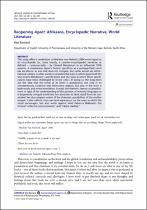Reopening Agaat: Afrikaans, Encyclopedic Narrative, World Literature
Abstract
This essay offers a meditation on Marlene van Niekerk’s 2004 novel Agaat as an encyclopedic (or, more exactly, a counter-encyclopedic) narrative, as defined–controversially–by Edward Mendelson in an influential 1976 polemic. It emphasizes Agaat’s historic specificity as a postapartheid novel par excellence: as one that does not instigate, but rather annuls an ethnic-national culture. In other words it considers the ways in which Agaat both fits and inverts Mendelson’s specifications and the ways in which these specifications have been challenged by recent critics. In doing so, the essay tests out the idea that the novel at its limits is paradoxical, not only in its simultaneously curatorial and destructive aspects, but also in the ways it both resists and invites translation. It reads Van Niekerk’s literary accomplishment in light of her understanding of the position of minority languages in a desperately unequal world and her attraction to (and recoil from) an outmoded, but also utopian notion of the shamanic possibilities of the mother tongue. It also reflects, from personal experience, on the ways in which the novel encourages, but also works against what Rebecca Walkowitz has termed “collective possessiveness” and “native reading.”.

